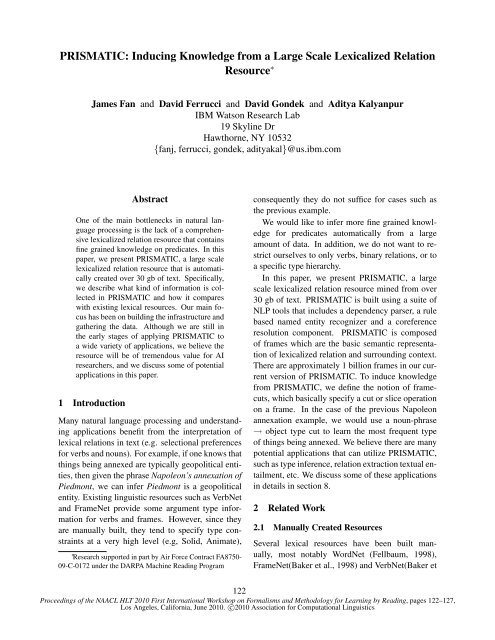W10-09
W10-09
W10-09
Create successful ePaper yourself
Turn your PDF publications into a flip-book with our unique Google optimized e-Paper software.
PRISMATIC: Inducing Knowledge from a Large Scale Lexicalized Relation<br />
Resource ∗<br />
James Fan and David Ferrucci and David Gondek and Aditya Kalyanpur<br />
IBM Watson Research Lab<br />
19 Skyline Dr<br />
Hawthorne, NY 10532<br />
{fanj, ferrucci, gondek, adityakal}@us.ibm.com<br />
Abstract<br />
One of the main bottlenecks in natural language<br />
processing is the lack of a comprehensive<br />
lexicalized relation resource that contains<br />
fine grained knowledge on predicates. In this<br />
paper, we present PRISMATIC, a large scale<br />
lexicalized relation resource that is automatically<br />
created over 30 gb of text. Specifically,<br />
we describe what kind of information is collected<br />
in PRISMATIC and how it compares<br />
with existing lexical resources. Our main focus<br />
has been on building the infrastructure and<br />
gathering the data. Although we are still in<br />
the early stages of applying PRISMATIC to<br />
a wide variety of applications, we believe the<br />
resource will be of tremendous value for AI<br />
researchers, and we discuss some of potential<br />
applications in this paper.<br />
1 Introduction<br />
Many natural language processing and understanding<br />
applications benefit from the interpretation of<br />
lexical relations in text (e.g. selectional preferences<br />
for verbs and nouns). For example, if one knows that<br />
things being annexed are typically geopolitical entities,<br />
then given the phrase Napoleon’s annexation of<br />
Piedmont, we can infer Piedmont is a geopolitical<br />
entity. Existing linguistic resources such as VerbNet<br />
and FrameNet provide some argument type information<br />
for verbs and frames. However, since they<br />
are manually built, they tend to specify type constraints<br />
at a very high level (e.g, Solid, Animate),<br />
∗ Research supported in part by Air Force Contract FA8750-<br />
<strong>09</strong>-C-0172 under the DARPA Machine Reading Program<br />
consequently they do not suffice for cases such as<br />
the previous example.<br />
We would like to infer more fine grained knowledge<br />
for predicates automatically from a large<br />
amount of data. In addition, we do not want to restrict<br />
ourselves to only verbs, binary relations, or to<br />
a specific type hierarchy.<br />
In this paper, we present PRISMATIC, a large<br />
scale lexicalized relation resource mined from over<br />
30 gb of text. PRISMATIC is built using a suite of<br />
NLP tools that includes a dependency parser, a rule<br />
based named entity recognizer and a coreference<br />
resolution component. PRISMATIC is composed<br />
of frames which are the basic semantic representation<br />
of lexicalized relation and surrounding context.<br />
There are approximately 1 billion frames in our current<br />
version of PRISMATIC. To induce knowledge<br />
from PRISMATIC, we define the notion of framecuts,<br />
which basically specify a cut or slice operation<br />
on a frame. In the case of the previous Napoleon<br />
annexation example, we would use a noun-phrase<br />
→ object type cut to learn the most frequent type<br />
of things being annexed. We believe there are many<br />
potential applications that can utilize PRISMATIC,<br />
such as type inference, relation extraction textual entailment,<br />
etc. We discuss some of these applications<br />
in details in section 8.<br />
2 Related Work<br />
2.1 Manually Created Resources<br />
Several lexical resources have been built manually,<br />
most notably WordNet (Fellbaum, 1998),<br />
FrameNet(Baker et al., 1998) and VerbNet(Baker et<br />
122<br />
Proceedings of the NAACL HLT 2010 First International Workshop on Formalisms and Methodology for Learning by Reading, pages 122–127,<br />
Los Angeles, California, June 2010. c○2010 Association for Computational Linguistics


